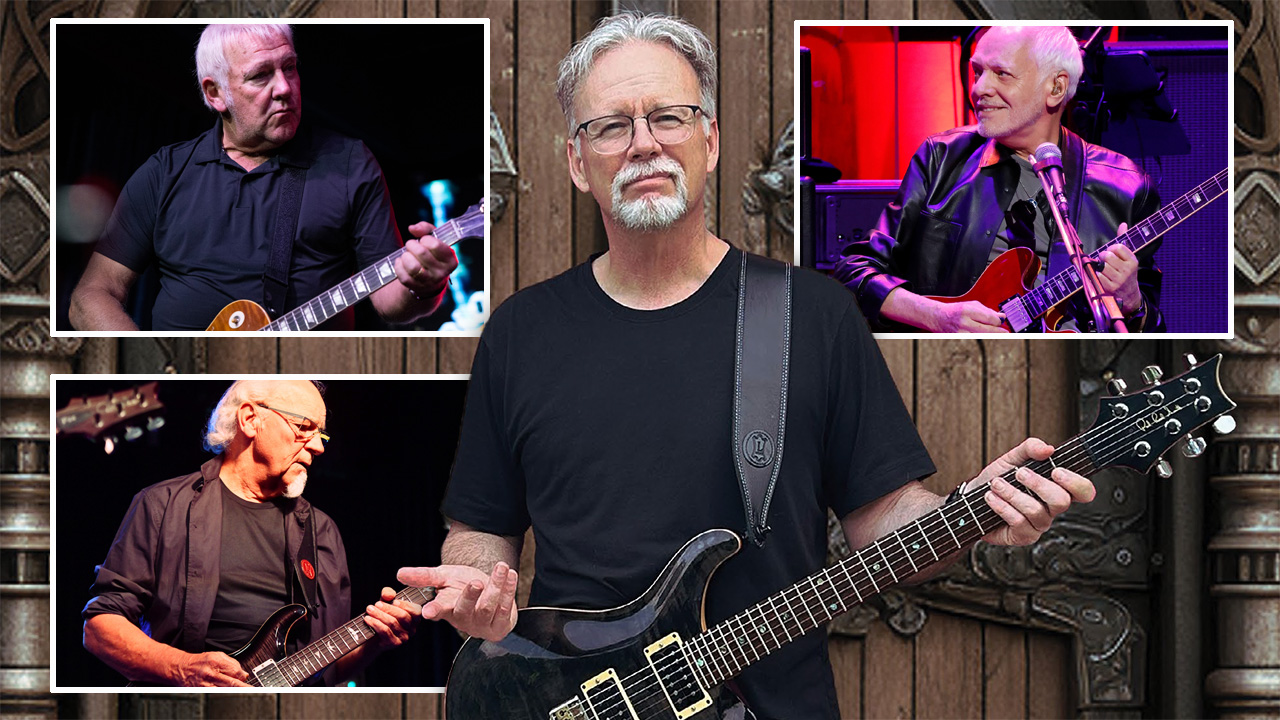Just over 30 years ago, guitarist Chris Herin formed US prog rockers Tiles, who recorded six well-received albums prior to going on hiatus after 2018 the release of Pretending 2 Run. Herin has kept a low profile since then – but he’s now returned with his first solo album, Hiding In Plain Sight. It includes guest appearances from more than 30 musicians, including Peter Frampton, Alex Lifeson and Jethro Tull alumni Martin Barre, John O'Hara and Doane Perry.
Herin was aided in the creation of the album by famed Rush producer Terry Brown, who helped shape its sound and introduced some of those musicians. Lyrically it explores Alzheimer's disease, influenced by Herin watching his father’s challenges with the condition. With talk of Tiles reuniting, Herin reflects on the extensive creative process that led to the release of this most personal of albums.
The Tiles project had a certain momentum, so what prompted you to consider writing a solo album?
Tiles went on hiatus in 2018 when all the vocalists retired. We haven’t disbanded or anything like that, but obviously it’s been a lengthy hiatus. I didn’t really set out to do a solo album. All through that time, I’d do little demos with Terry Brown just to have him catalogue them.
I was a little worried at first that the collection of music strayed a little bit from what maybe people expect from the progressive rock umbrella. But then I thought that most progressive rock fans have a pretty diverse palate, so I just went ahead – and it became this album.
It isn’t a classic solo album in that you’ve recruited so many other musicians to perform on it.
Towards the end of recording, the record label said, “This all sounds great, but we don’t recognise any of your lead guitar playing.” So, finally, I did solos on a track called A Wrinkle In Time. When the Peter Frampton idea came up, I certainly didn’t say, “Well, we can’t have Peter play because I want to play that solo.”
Then we stumbled on some of Terry’s connections. He’s responsible for Michael Sadler from Saga, Peter Frampton, Alex Lifeson and Kim Mitchell. He was the conduit through which they were invited to participate, and thankfully agreed. We took care to match the musicians’ style with what we were looking for with the song, especially vocalists and drummers.
When you’ve got musicians like that, you give them completely free rein to do whatever they want, don’t you?
Yeah – a good case in point is that I’d asked Martin Barre to contribute a guitar solo. He was intrigued because Doane Perry had already laid the drum track, so it was kind of fun for him to play again with Doane, virtually.
When we got his tracks, he’d done so much more than just the solo; he played the flute, mandolin and additional rhythm guitar. He did it all, even though that wasn’t really what I was expecting, but I certainly didn’t complain because it turned out so well.”
Have you always admired Alex Lifeson’s work?
For a very long time. He plays on a song called Second Ending, a very moody and atmospheric-type piece. I’m sure all us Rush fans know that Alex has moved away from a lot of soloing and likes to work with different textures. In fact, you probably wouldn’t know it was him unless you were told. It’s not a lot of flashy rhythm guitar playing or soloing.
We got multiple takes from everyone, and it was so much fun listening to how Alex came up with those textures and how they interlocked. I’d almost like to do an alternate mix of it, where it’s all stripped back, and let Alex’s art carry the arrangement. I think people would really be interested in hearing that.
I had to make sure the lyrics didn’t get too depressing… If you didn’t know it’s the theme of the album, they can be interpreted in other ways
Did you find writing the about your father difficult, or was it cathartic?
It wasn’t something I set out to do at the inception of the project. The first lyrics tended to reflect on the experiences my family and I had with my dad’s Alzheimer’s condition. Even though he passed away in 2011, I’m always writing lyrics, so I had all of these sentences from that time that I could draw upon.
Once the first two songs were heading in that direction, I thought it was a good opportunity to make that the theme of the album, and donate the proceeds to Alzheimer’s charities. I had to make sure the lyrics didn’t drift into too depressing a territory, as it wouldn’t be a fun listening experience for people. If you didn’t know it’s the theme of the album, the lyrics can be interpreted in other ways.
Writing them definitely had an element of struggle to it. In fact, after I got them finished I thought, “If I don’t ever write lyrics again, I’m not sure if I’d be too bothered.”
What are your thoughts on taking this project forward?
The problem with playing live would not be the performance, but preparing and staying rehearsed. I could get Matthew Parmenter, who sings on a bunch of the songs and who’s in the band Discipline, and Jeff Whittle, the Tiles bass player, and come up with some acoustic versions. We could maybe do some sponsored events with the local Alzheimer’s Association. That seems pretty feasible, because all the songs were written on acoustic guitar.
But I’ve already started writing some new stuff that would be earmarked for Tiles. That would be a fun thing to kick back into gear. I think there’s about half an hour’s material written for a new Tiles album.



